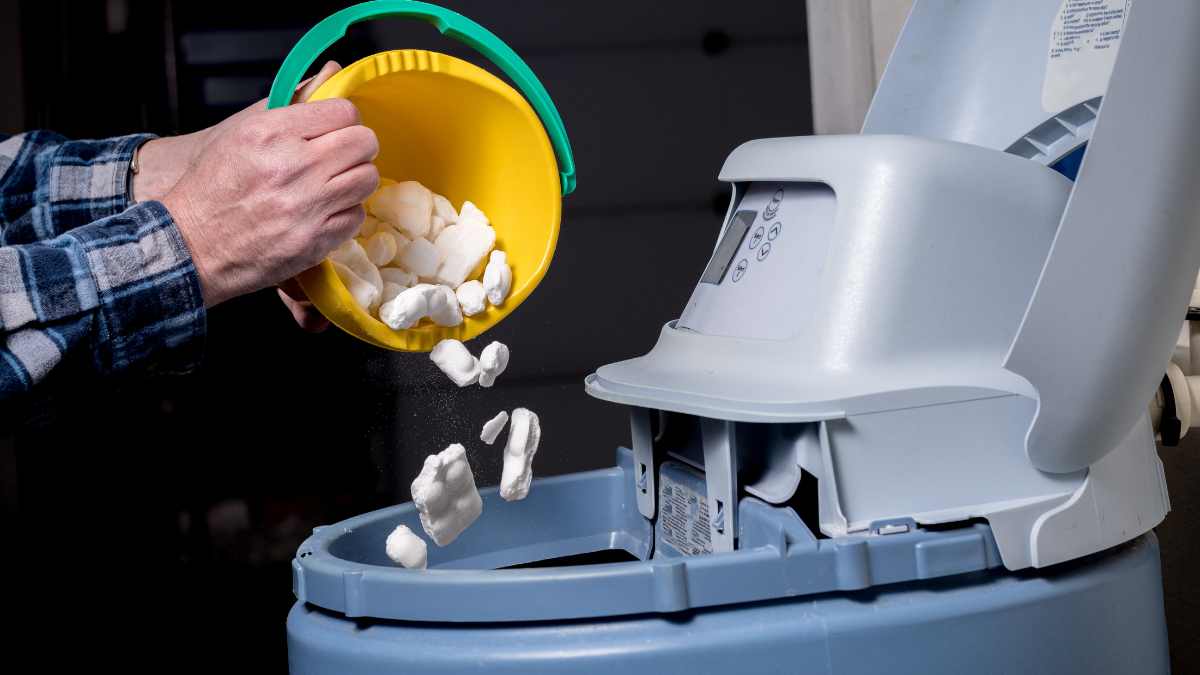Can Swimming Pool Salt Be Used in a Water Softener?
Salt is an important part of water treatment, but did you know that there is a difference between pool salt and water softener salt?
While pool salt is great for pool water, if you’re using it in your water softener, you could be doing more harm than good.
Whether pool salt, rock salt, table salt or road salt – all salt is not created equal.
In this article, we’ll explain the difference between pool salt and water softener salt – and what will happen if you use pool salt in your water softener. (Quick answer: Don’t do it.)
Table of Contents
What Is a Water Softener?
A water softener is an appliance that’s used to remove hard minerals from water. Hard water contains high levels of minerals like calcium, iron and magnesium, among others.
Hard water is safe – and even healthy!- but can cause problems when used for laundry, dishes, and plumbing. A water softener will remove these minerals from the water, making it softer and easier to use.
There are a few different types of water softeners, but the most common one is the ion exchange water softener. This type of softener works by exchanging the hard minerals in the water for other minerals, such as sodium (or less common, potassium chloride). This helps to prevent buildup and makes cleaning easier.
If you have hard water, a water softener can be a great way to make your life easier. Soft water is easier on your laundry, dishes, and pipes.
It can also help to reduce the amount of soap and detergent you need to use. Also, soft water can improve the taste and smell of your drinking water.
- 💧【 PERFECTLY DESIGNED FOR 3-4 BATHROOMS…
- 💧【 HIGHLY EFFICIENT 】Rated to treat…
- 💧【 PROTECTS YOUR APPLIANCES 】Reduces…
- 💧【 AUTOMATIC DIGITAL METERED CONTROL…
How Does a Water Softener Work?
There are many types of water softeners out there, but they all basically work in the same way. By exchanging ions in the water, they remove hard water minerals like calcium and magnesium. This leaves your water feeling softer and less abrasive.
Water softener tanks come in all shapes and sizes, but most of them have three main parts: a mineral tank with resin beads, a brine solution tank, and a control valve. The mineral tank is where the ion exchange takes place. The brine tank stores water that’s saturated with salt, and the control valve regulates the flow of water through the system.
Sometimes a visual is the best way to understand ideas. Here’s a graphic that shows the salt tank and the regeneration process using the ion exchange resin.

Do You Need a Water Softener?
If you’re thinking about installing a water softener in your home, it’s important to do your research and choose the right system for your needs. Once your softener is up and running, you’ll enjoy all the benefits that come with soft water.
Here are some of the top advantages of having a water softener in your home:
Better tasting water
Soft water tastes better and is often preferred by people when compared to hard water. Soft water is better for making tea, coffee, and cooking in general, as it doesn’t affect the flavor.
Longer-lasting appliances
Hard minerals in water can damage appliances over time. Soft water doesn’t contain these minerals, so your appliances will last longer and won’t need as much maintenance.
Softer, smoother skin and hair
Soft water is gentler on your skin and hair, making them softer and smoother. Hard water can dry out your skin and leave your hair feeling brittle.
Reduced soap scum and lime scale
Soft water doesn’t leave as much soap scum and lime scale buildup as hard water does. This means less scouring on your bathroom fixtures and less money spent on cleaning products.
Lower energy bills
Soft water requires less energy to heat up. (The minerals in hard water raise its boiling point. Who knew!?) This means you’ll save money on your energy bills. Your water heater won’t have to work as hard to heat up the water, and your washing machine and dishwasher won’t need as much energy to run.
Eco-friendly
Soft water is better for the environment as it uses much less energy, soap and detergents for cleaning.
Overall, having a water softener in your home can make a big difference in the quality of your water and the overall health of your home. Just be sure to choose the right system for your needs and maintain it properly so it continues to work as it should.
Let’s Talk Pool Salt: What Is It Used For?
A lot of people with swimming pools use pool salt as a pool additive. They do so for different reasons.
The most common reason for adding pool salt is because it’s needed for a salt water chorine generator (SWG).
All pools need some form of bacteria inhibitor, or they’d quickly become filled with algae and other nasty bacteria. Chlorine kills the bacteria, keeping the water safe and clean for swimming.
A simple way is to add chlorine manually. This is usually in the form of liquid or slow-dissolve dispenser tablets.
Another way is by using a salt water chlorine generator.

The SWG works by separating the salt (from a salted pool) into its two molecules: chlorine and sodium. The two molecules are then pumped back into the pool. Voila! There’s the chlorine that’s needed. Except with a SWG, the pool owner adds salt to the pool, not chlorine (directly, anyway).
Those who own a saltwater pool say that their pools smell less like chlorine and reduce skin irritation that can be caused by chlorine. And an SWG system can be set up to run automatically, so there’s less maintenance. (A salt water pool will still need periodic shock, though, plus any other chemical maintenance that would normally be expected.)
No products found.
Beyond using salt for generating chlorine, some pool owners say it improves the feel of the water, making it more comfortable and “silky.” Salt can also make a swimmer more buoyant, which can make swimming more fun.
And finally, some users believe that salt changes the water pH level, although this is debatable. If a pH change is truly needed, baking soda (alkaline), muriatic acid (acidic) or other pool treatments would be much more effective.
A pool store can look at your water chemistry and advise just the right additions for the clean, healthy pool you want.
Is Swimming Pool Salt the Same As Water Softener Salt?
This is a question asked by almost everyone with a pool and a water softener. And the answer is: kind of.
Both swimming pool salt and water softener salt are made of the same thing – which is mostly sodium chloride (table salt). However, the two types of salt have different textures and sizes. And swimming pool salt can be treated with (safe) chemicals to help preserve it or a flowing agent to keep it from clumping.
But also, they’re made differently because they’re used differently. Swimming pool salt is specially designed to dissolve quickly and evenly in water. It’s more fine and disburses fast.
Water softener salt, on the other hand, is designed to slowly dissolve and release over time. It’s a coarser salt by far, and it often comes in pellets or large chunks.
So if you’re looking to buy salt for your water softener, make sure to get water softener salt – and not swimming pool salt. They’re not interchangeable and neither will work well in the other’s place.
What Will Happen if I Use Swimming Pool Salt in My Water Softener?
If you’ve ever wondered what would happen if you used swimming pool salt in your water softener, we’re here to tell you. The short answer is: nothing good.

In fact, using pool salt in your water softener can damage the unit and make it less effective at softening your water.
Now, if you’ve just dumped some pool salt where it shouldn’t be – don’t panic. Once or twice is not going to ruin your water softener. But it’s a good idea to stop right now.
And if you can, remove whatever pool salt you can fish out, then refill it with softener salt.
So why is pool salt so bad for water softeners?
Well, pool salt is made of salt crystals that are smaller than the salt pellets used in water softeners. Pool salt is made to break down fast. This means that the pool salt will dissolve much more quickly than the water softener is designed to handle. (See above “How Does a Water Softener Work?”)
Too much salt will overwhelm the complex exchange of ions, which happens at a specific rate under specific salt conditions.
If your softener system is flooded with too much salt and too fast, it simply doesn’t work. You can end up with salty water, corroded parts and a build-up of salt and by-product sludge.
In short, pool salt makes your water softener sick.
So, if you’re wondering whether you should use pool salt in your water softener, the answer is a resounding no. Use water softener salt as recommended in your water softener owner’s manual.
How Often Should I Add Salt to My Water Softener?
If you have a water softener, you might be wondering how often you need to add salt to it. The answer depends on a few things, including the size of water softener you have, the water hardness, and how much water you use.
Generally speaking, you should add water softener pellets or crystals every few months. But if you have hard water, you may need to add salt more often. And if you use a lot of water, you may need to add salt more often as well.
If you’re not sure about how often you should add salt to your water softener, the best thing to do is consult your owner’s manual or contact the manufacturer. They should be able to give you specific feedback on how often to add salt to your water softener.
The best thing to do is pop open the lid every week or so and check the amount of salt in the reservoir. It’s fine to let the salt go down, but make sure to fill it back up when it reaches about 25-30%. Fill to the mark indicated on your unit or to about 6-8 inches from the top.
Also, this is a good time to check for any salt bridges (a hard crust of salt) and gently but firmly break it up. A broomstick or other strong, blunt stick works great. Be gentle!
After you’ve done this for a couple of months, you’ll have a good idea of how often your water softener needs more salt. And if you forget, you’ll likely notice the change in your water quality – plus many softener units have an alarm.
Wrapping Things Up
The bottom line? Just remember that pool salt should never be used in a water softener. Pool salt crystals dissolve too quickly and can choke the ion exchange process, leading to salty water, corroded parts, and sludge build-up.
The best way to make sure your water softener works correctly is to add the right type of salt at regular intervals – as recommended by the manufacturer or shown on the unit itself.
By doing this regularly, you’ll maintain the perfect level of salt in your system while protecting it from potential damage caused by using swimming pool salts.
What to Do Now
Enjoy what you’re reading? Here’s what to do next:
- Go ahead and Pin or Share this article right now. Don’t worry, we’ll wait!
- Leave a comment below
- Read another blog post here
- Subscribe to our (almost) famous newsletter:
Thanks for stopping by! See you next time. 🙂








